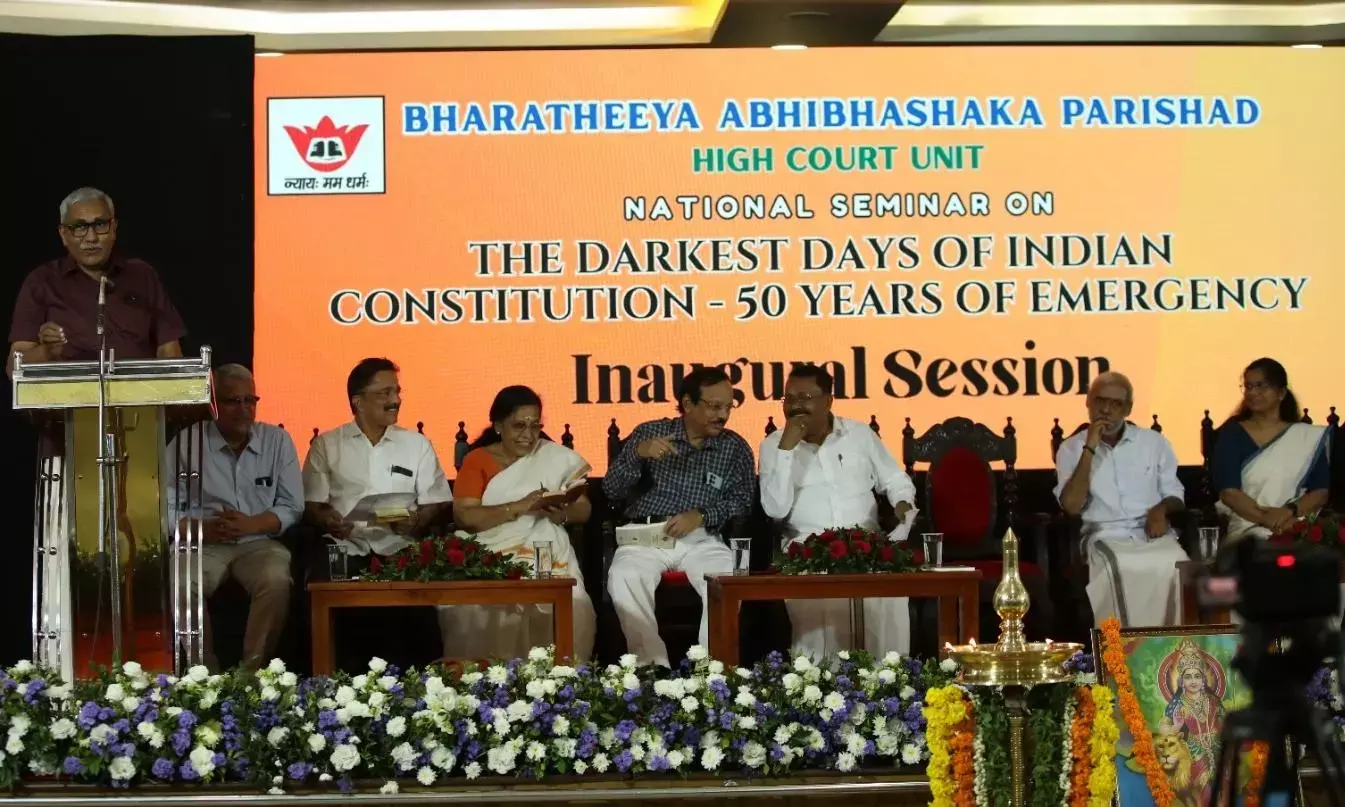False Narrative Of 'Undeclared Emergency' Propagated By Those Unaware Of Atrocities Of Actual Emergency: Justice PN Ravindran

Justice PN Ravindran, former judge of the Kerala High Court, said today while speaking at an event, that the false narrative of there being an "undeclared emergency" now is being propagated by those who did not live through what happened in the Emergency of 1975.
The former judge was speaking at the National Seminar on "The Darkest Days of Indian Constitution- 50 Years of Emergency" at Ernakulam in Kerala.
"Nowadays, some political parties and some lawyers say that there is now an 'undeclared emergency'. I think such people may not have lived through what happened in the year 1975", Justice Ravindran said.
He added while delivering the presidential address in the inaugural session of the Seminar that though he had not suffered personally during the Emergency, there were so many atrocities that were committed then.
"Such narratives are part of a concerted effort to make people forget what happened in 1975", he said about the "undeclared emergency" narrative.
Praising the organisers of the event, he said, "Every year, events like this should be held to remind people of the history of the Emergency".
He said that the successors of those who bravely fought the emergency are now saying that there is an undeclared emergency. "It is the Duty of lawyers to remind the people that we had a dark past when the Congress was in power", he said, concluding his remarks.
Slave Mentality of Judges
Speaking at the event, Advocate A Jayashankar, a leading lawyer and political commentator, said that many judges during the Emergency period had a "slave mentality". He spoke about how Judges were handpicked during that period and how such judges got an upper hand in their careers.
He said that the partial stay of the Judgment of the Allahabad High Court by Justice Krishna Iyer of the Supreme Court was responsible for the Emergency. "Had the stay been a complete stay or had the stay been refused, the Emergency might not have happened", he said.
He said that Indira Gandhi had later said that she was not aware of Constitutional provisions, but was advised by somebody else to do what she did. He said that though the comment cannot be taken at face value, we can’t disregard the same either.
He explained why he considers the 42nd Amendment to the Constitution the worst atrocity of the Emergency.
Media Failed in Duty
Advocate and former Governor of Goa and Mizoram, P. S. Sreedharan Pillai, said that the present-day media has failed in its duty to create awareness about what transpired during the Emergency, during its 50th anniversary.
Speaking during the inaugural session of the Seminar, the former Governor said that the media has failed in its duty despite many media institutions being victims of the Emergency.
"Kerala is far behind in public awareness about what happened during the Emergency. We have failed to make people aware of the atrocities committed during the emergency", he said.
He said that the ruling party of Kerala, CPI(M), now claims that it led the fight for what it now terms the second freedom struggle. He said that the same is a well-thought-out lie. He said that though party workers protested for the first three months and went to jail, thereafter, when they realised the terror of the Emergency, there was nobody who protested or went to jail from that organisation. He challenged that even if a single instance of any person from the CPI(M) being involved thereafter in an anti-emergency protest or having gone to prison for the same is pointed out, he would quit public life.
Public and Press Must Be Vigilant
Senior Advocate and former Additional Solicitor General of India Ashok Mehta spoke on the subject "Role of Judiciary as Parens Patriae Vis-À-Vis the Constitution".
He started his speech by saying, “ ’Every single Policeman has the right to shoot and kill anyone on the road today, nobody has the right to question’- this was said by Attorney General Niren Dey in the Supreme Court. Horrible”.
“Irony is none protested, I repeat, none protested, none dared to say it is not the law of India, the opportunity was lost forever”, he said.
He spoke in detail about the “Rajan case” from Kerala. He spoke about how Niren Dey then had a change of heart and appeared for the victim in the Rajan case before the Supreme Court, and how that litigation led to the resignation of the then Chief Minister of Kerala.
"Complaints regarding molestation of women and looting of property were never entertained nor pursued. There are no details of places of firing and killing the innocent persons and even the Magistrates' orders for firing were obtained by tampering with logbooks", he said.
He spoke about the contributions of Justice HR Khanna. He said that whenever he visits the Supreme Court, he visits Court number two to pay homage to Justice HR Khanna, whose portrait is placed there. He called for a standing ovation by the audition for Justice Jagmohanlal Sinha and Justice HR Khanna, for their contributions in trying to protect people's rights.
He concluded by saying that the public and the press must continue to be vigilant. "No government should be able to misuse the power given by the Constitution", he said.
The one-day National Seminar on "The Darkest Days of Indian Constitution- 50 Years of Emergency" is organised by Kerala High Court unit of the Bharatheeya Abhibhashaka Parishad. The seminar is accompanied by an exhibition pertaining to the Emergency.
K. Raman Pillai, Anti-Emergency activist & former State President, Bharaya Janata Party, M. Rajasekhara Panicker, former Editor of the Indian Express, R. Mohanan, the General Secretary of the Association of Emergency Victims Kerala and Senior Advocate K. Sreenivas Moorthy, the National President of Akhil Bharatiya Adhivakta Parishad, are also speakers in the Seminar.

